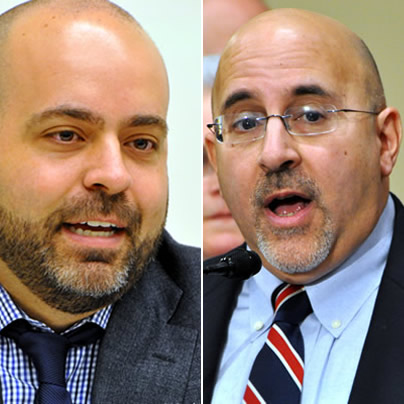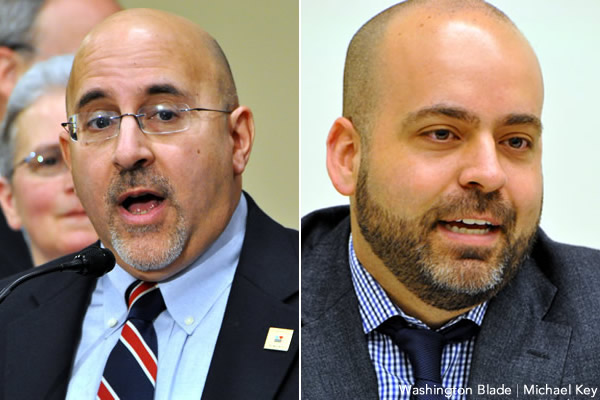Politics
Religious exemption inspires heated debate at ENDA panel
Wolfson challenges current language in LGBT anti-discrimation bill


Freedom to Marry’s Evan Wolfson (left) and Freedom to Work’s Tico Almeida had heated exchange on ENDA’s religious exemption (Blade file photos by Michael Key).
NEW YORK — The appropriate scope of the religious exemption in the Employment Non-Discrimination Act continues to stir debate as a prominent marriage equality advocate on Thursday made a surprise endorsement of narrowing the broad provision in the bill.
Evan Wolfson, president of Freedom to Marry, said he shares the “grave concerns” expressed by the American Civil Liberties Union over the religious exemption — which he said would “carve coverage by certain kinds of entities for LGBT people” — during a panel as part of Freedom to Work’s premier “Situation Room” in New York City.
“I do have grave concerns about the specific language in the specific bill,” Wolfson said. “That’s one of the points of difference I have with Freedom to Work on this current bill.”
Currently, ENDA has a religious exemption that provides leeway for religious organizations, like churches or religious schools, to discriminate against LGBT employees. That same leeway isn’t found under Title VII, which prohibits religious organizations from discriminating on the basis of race, gender or national origin.
Wolfson and Tico Almeida, president of Freedom to Work and proponent of the religious exemption, were the lone speakers on the second panel of the day. Wolfson’s main purpose on the panel was to talk about the lessons the campaign to pass ENDA can learn from the marriage equality fight.
Almeida initially responded by saying the religious exemption has value in allaying concerns from Republican lawmakers who are undecided on ENDA.
“I would say that in a bunch of Republican meetings we spend a majority of the time talking about the religious exemption and exactly how it will apply, what the case law is,” Almeida said.
Almeida co-wrote the current version of the religious exemption when working as a staffer for Rep. George Miller (D-Calif.). It was passed as an amendment on the U.S. House floor in 2007 to a gay-only version of ENDA by a vote of 402-25.
But Almeida qualified his support for the religious exemption by saying he believes religious organizations shouldn’t be able to receive federal funds if they discriminate against LGBT people. But, Almeida continued, the mechanism to prohibit this discrimination isn’t ENDA; rather, it should be a workplace non-discrimination executive order signed by President Obama.
“I think there’s complete uniformity that we are all pushing for a federal policy that if you take and profit from federal dollars, you must follow American values, you must pledge not to discriminate against LGBT folks — and if you get caught, there should be consequences,” Almeida said.
But Wolfson quickly retorted as the panel developed into a heated debate between him and Almeida that seemed to become almost hostile as the session closed.
“We have a body of laws across the country that include sexual orientation and gender identity as prohibited discriminatory classifications alongside race, sex and others — and they have all followed generally a certain kind of exemption — as had Title VII and the Civil Rights Act, and so on,” Wolfson said. “The problem with this current draft of ENDA is that exemption goes far beyond what that body of experience has taught us is the right balance.”
Wolfson added the argument in favor of ENDA to undecided lawmakers should be to look at existing law throughout the states as opposed to enshrining “new and unnecessary and dangerous exemptions from non-discrimination law.”
“By the way, calling them religious exemptions implies that there’s some religious problem to be solved,” Wolfson said. “There is no religious problem to be solved: what these are are licenses to discriminate.”
Almeida, a Catholic, responded by saying he thinks attitudes should change within the church by action from members of that particular faith.
“I don’t believe civil rights statute in the form of Title VII and ENDA should be used to force the Catholic Church to make a change to its policies,” Almeida said. “I think we will push them, and it may take decades, and it may take more than my lifetime, but we will push them in other ways.”
Almeida added he doesn’t understand the argument the religious exemption in ENDA is a new approach because he said he “literally copied and pasted it from Title VII.”
Besides, Almeida also said groups that oppose ENDA’s religious exemption missed an opportunity to propose an amendment when the Senate Health, Education, Labor & Pensions Committee voted on the bill in July. Also, he challenged them to make public the language they would prefer instead.
“I would love for those organizations to publicly communicate to the LGBT community and to Congress what is their proposal,” Almeida said. “They made a big fuss …, and they didn’t seek an amendment at markup. They didn’t ask any of our progressive champions, and there are very progressive champions on that committee, or if they asked, then they got rejected.”
Wolfson countered by saying Almeida’s proposal to change the Catholic Church from within is “completely irrelevant” to the conversation of putting a “license to discriminate” in a statute.
“Nobody is saying that the Catholic Church should be sued or told what to do as a matter of law when it comes to doctrine or the church, or ministers,” Wolfson said. “That’s misleading language that might confuse people in a way that you didn’t intend.”
Additionally, Wolfson said Almeida was mischaracterizing the religious exemption in ENDA by saying it’s lifted from Title VII. Almeida conceded that point on the panel.
“To say that something has some degree of religion in it, but now that it’s in the marketplace, it can now fire not just the priest, but the janitor, that’s an exemption that doesn’t exist in Title VII or any other parts of law,” Wolfson said.
Concluding his argument, Wolfson said the religious exemption issue must be resolved because it’s giving fuel to the anti-LGBT forces seeking to thwart ENDA passage.
“The religious exemption language thing is mostly a distraction, it’s a non-and-wrong solution to a non-problem, but becomes important if it get put into law,” Wolfson said.
Ian Thompson, legislative representative for the ACLU, told the Blade after the panel he commends Wolfson for endorsing a narrower religious exemption for ENDA, calling the news “a great development.”
“As a leader of the freedom to marry movement, he knows as well as anyone the importance of rejecting overly broad religious exemptions,” Thompson said.
Further, Thompson responded to Almeida’s claims that narrower language on religious institutions hasn’t been proposed by pointing to existing law.
“The alternative to ENDA’s unprecedented religious exemption has been and remains crystal clear,” Thompson said. “Just as our civil rights laws have never permitted blank checks to discriminate based on race, sex, national origin, age, and disability, they must not now do so based on sexual orientation and gender identity.”
Discussion of the religious exemption also came up during the first panel of the day, which consisted of six speakers from a bipartisan group of LGBT organizations. Paul Schindler, editor-in-chief of Gay City News, asked the panel if they were comfortable with the language.
Gregory Angelo, executive director of the National Log Cabin Republicans, started off the discussion by saying he was “comfortable” with the current wording because it’s hard enough selling the bill as it is.
“Without naming names, there are meetings that I have had with Republicans — both in the House and the Senate — where there’s some Republicans who don’t feel those religious protections go far enough,” Angelo said. “We’re pushing back against that. I think the protections as they exist now are strong, they’re solid.”
Melissa Sklarz, a transgender Democratic activist from Stonewall Democrats of New York City, seemed to support the exemption on a temporary basis as a way to win support for the bill, saying it won’t hold up in court and is just “a barrier to try to win allies” on the Republican side.
“It’s a good idea,” Sklarz said. “We watched them fight LGBT equality in ‘Don’t Ask, Don’t Tell’ and we’ve watched it in marriage. As they keep throwing things at ideas that prevent equality, they will not stand up. If this is going to win allies among the moderate and right-wing so we can get it to the floor, then great.”
Asked by Schindler whether under the current religious exemption he could be fired at a Catholic hospital or a Mormon book store, Almeida replied, “It depends.”
“It depends on the facts,” Almeida said. “Law has very few bright line tests, and neither the Title VII religious exemption, nor the ENDA religious exemption, list types of organizations. So, courts have created factors that are considered.”
Almeida said courts have established that for-profit businesses are eligible for the religious exemption under existing law. But he acknowledged that organizations like the Catholic Church and Catholic Charities will be able to continue to discriminate against LGBT people in hiring and firing decisions.
“By tying the ENDA religious exemption explicitly to the Title VII religious exemption, that gives us the most clarity, and as a byproduct, and for me it’s just a byproduct, it’s going to be the one to help us win,” Almeida said.
Politics
After Biden signs TikTok ban its CEO vows federal court battle
“Rest assured, we aren’t going anywhere,” CEO said

President Joe Biden signed an appropriations bill into law on Wednesday that provides multi-billion dollar funding and military aid for Ukraine, Israel, and Taiwan after months of delay and Congressional infighting.
A separate bill Biden signed within the aid package contained a bipartisan provision that will ban the popular social media app TikTok from the United States if its Chinese parent company ByteDance does not sell off the American subsidiary.
Reacting, TikTok CEO Shou Zi Chew said Wednesday that the Culver City, Calif.-based company would go to court to try to remain online in the U.S.
In a video posted on the company’s social media accounts, Chew denounced the potential ban: “Make no mistake, this is a ban, a ban of TikTok and a ban on you and your voice,” Chew said. “Rest assured, we aren’t going anywhere. We are confident and we will keep fighting for your rights in the courts. The facts and the constitution are on our side, and we expect to prevail,” he added.
Our response to the TikTok Ban Bill in the US: https://t.co/LpoE67sxHo
— TikTokComms (@TikTokComms) April 24, 2024
White House Press Secretary Karine Jean-Pierre adamantly denied during a press briefing on Wednesday that the bill constitutes a ban, reiterating the administration’s hope that TikTok will be purchased by a third-party buyer and referencing media reports about the many firms that are interested.
Chew has repeatedly testified in both the House and Senate regarding ByteDance’s ability to mine personal data of its 170 million plus American subscribers, maintaining that user data is secure and not shared with either ByteDance nor agencies of the Chinese government. The testimony failed to assuage lawmakers’ doubts.
In an email, the former chair of the House Intelligence Committee, U.S. Rep. Adam Schiff (D-Calif.), who doesn’t support a blanket ban of the app, told the Washington Blade:
“As the former chairman of the House Intelligence Committee, I have long worked to safeguard Americans’ freedoms and security both at home and abroad. The Chinese Communist Party’s ability to exploit private user data and to manipulate public opinion through TikTok present serious national security concerns. For that reason, I believe that divestiture presents the best option to preserve access to the platform, while ameliorating these risks. I do not support a ban on TikTok while there are other less restrictive means available, and this legislation will give the administration the leverage and authority to require divestiture.”
A spokesperson for U.S. Sen. Alex Padilla (D-Calif.) told the Blade: “Senator Padilla believes we can support speech and creativity while also protecting data privacy and security. TikTok’s relationship to the Chinese Communist Party poses significant data privacy concerns. He will continue working with the Biden-Harris administration and his colleagues in Congress to safeguard Americans’ data privacy and foster continued innovation.”
The law, which gives ByteDance 270 days to divest TikTok’s U.S. assets, expires with a January 19, 2025 deadline for a sale. The date is one day before Biden’s term is set to expire, although he could extend the deadline by three months if he determines ByteDance is making progress or the transaction faces uncertainty in a federal court.
Former President Donald Trump’s executive order in 2020, which sought to ban TikTok and Chinese-owned WeChat, a unit of Beijing-based Tencent, in the U.S., was blocked by federal courts.
TikTok has previously fought efforts to ban its widely popular app by the state of Montana last year, in a case that saw a federal judge in Helena block that state ban, citing free-speech grounds.
The South China Morning Post reported this week that the four-year battle over TikTok is a significant front in a war over the internet and technology between Washington and Beijing. Last week, Apple said China had ordered it to remove Meta Platforms’s WhatsApp and Threads from its App Store in China over Chinese national security concerns.
A spokesperson for the ACLU told the Blade in a statement that “banning or requiring divestiture of TikTok would set an alarming global precedent for excessive government control over social media platforms.”
LGBTQ TikToker users are alarmed, fearing that a ban will represent the disruption of networks of support and activism. However, queer social media influencers who operate on multiple platforms expressed some doubts as to long term impact.
Los Angeles Blade contributor Chris Stanley told the Blade:
“It might affect us slightly, because TikTok is so easy to go viral on. Which obviously means more brand deals, etc. However they also suppress and shadow ban LGBTQ creators frequently. But we will definitely be focusing our energy more on other platforms with this uncertainty going forward. Lucky for us, we aren’t one trick ponies and have multiple other platforms built.”
Brooklyn, N.Y.,-based gay social media creator and influencer Artem Bezrukavenko told the Blade:
“For smart creators it won’t because they have multiple platforms. For people who put all their livelihood yes. Like people who do livestreams,” he said adding: “Personally I’m happy it gets banned or American company will own it so they will be less homophobic to us.”
TikTok’s LGBTQ following has generally positive experiences although there have been widely reported instances of users, notably transgender users, seemingly targeted by the platform’s algorithms and having their accounts banned or repeatedly suspended.
Of greater concern is the staggering rise in anti-LGBTQ violence and threats on the platform prompting LGBTQ advocacy group GLAAD, in its annual Social Media Safety Index, to give TikTok a failing score on LGBTQ safety.
Additional reporting by Christopher Kane
Politics
Smithsonian staff concerned about future of LGBTQ programming amid GOP scrutiny
Secretary Lonnie Bunch says ‘LGBTQ+ content is welcome’

Staff at the Smithsonian Institution are concerned about the future of LGBTQ programming as several events featuring a drag performer were cancelled or postponed following scrutiny by House Republicans, according to emails reviewed by the Washington Post.
In December, Secretary Lonnie G. Bunch III appeared before a hearing led by GOP members of the Committee on House Administration, who flagged concerns about the Smithsonian’s involvement in “the Left’s indoctrination of our children.”
Under questioning from U.S. Rep. Stephanie Bice (R-Okla.), Bunch said he was “surprised” to learn the Smithsonian had hosted six drag events over the past three years, telling the lawmakers “It’s not appropriate to expose children” to these performances.
Collaborations with drag artist Pattie Gonia in December, January, and March were subsequently postponed or cancelled, the Post reported on Saturday, adding that a Smithsonian spokesperson blamed “budgetary constraints and other resource issues” and the museums are still developing programming for Pride month in June.
“I, along with all senior leaders, take seriously the concerns expressed by staff and will continue to do so,” Bunch said in a statement to the paper. “As we have reiterated, LGBTQ+ content is welcome at the Smithsonian.”
The secretary sent an email on Friday expressing plans to meet with leaders of the Smithsonian Pride Alliance, one of the two groups that detailed their concerns to him following December’s hearing.
Bunch told the Pride Alliance in January that with his response to Bice’s question, his intention was to “immediately stress that the Smithsonian does not expose children to inappropriate content.”
“A hearing setting does not give you ample time to expand,” he said, adding that with more time he would have spoken “more broadly about the merits and goals of our programming and content development and how we equip parents to make choices about what content their children experience.”
Politics
Survey finds support for Biden among LGBTQ adults persists despite misgivings
Data for Progress previewed the results exclusively with the Blade

A new survey by Data for Progress found LGBTQ adults overwhelmingly favor President Joe Biden and Democrats over his 2024 rival former President Donald Trump and Republicans, but responses to other questions may signal potential headwinds for Biden’s reelection campaign.
The organization shared the findings of its poll, which included 873 respondents from across the country including an oversample of transgender adults, exclusively with the Washington Blade on Thursday.
Despite the clear margin of support for the president, with only 22 percent of respondents reporting that they have a very favorable or somewhat favorable opinion of Trump, answers were more mixed when it came to assessments of Biden’s performance over the past four years and his party’s record of protecting queer and trans Americans.
Forty-five percent of respondents said the Biden-Harris administration has performed better than they expected, while 47 percent said the administration’s record has been worse than they anticipated. A greater margin of trans adults in the survey — 52 vs. 37 percent — said their expectations were not met.
Seventy precent of all LGBTQ respondents and 81 percent of those who identify as trans said the Democratic Party should be doing more for queer and trans folks, while just 24 percent of all survey participants and 17 percent of trans participants agreed the party is already doing enough.
With respect to the issues respondents care about the most when deciding between the candidates on their ballots, LGBTQ issues were second only to the economy, eclipsing other considerations like abortion and threats to democracy.
These answers may reflect heightened fear and anxiety among LGBTQ adults as a consequence of the dramatic uptick over the past few years in rhetorical, legislative, and violent bias-motivated attacks against the community, especially targeting queer and trans folks.
The survey found that while LGBTQ adults are highly motivated to vote in November, there are signs of ennui. For example, enthusiasm was substantially lower among those aged 18 to 24 and 25 to 39 compared with adults 40 and older. And a plurality of younger LGBTQ respondents said they believe that neither of the country’s two major political parties care about them.
-

 State Department3 days ago
State Department3 days agoState Department releases annual human rights report
-

 South America1 day ago
South America1 day agoArgentina government dismisses transgender public sector employees
-

 District of Columbia1 day ago
District of Columbia1 day agoCatching up with the asexuals and aromantics of D.C.
-

 Politics4 days ago
Politics4 days agoSmithsonian staff concerned about future of LGBTQ programming amid GOP scrutiny












